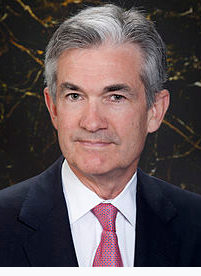President Donald Trump isn’t going to bully the Federal Reserve into making a drastic, unwarranted cut in interest rates, Fed Chair Jerome H. “Jay” Powell indicated in a speech Tuesday at the Embassy Suites by Hilton in downtown Denver.
The central banker didn’t mention Trump by name, but Powell’s statement of Fed political independence was clear that the central bank won’t launch a gigantic and unwarranted cut in interest rates that Trump is demanding.

Powell also said any massive global spike in oil prices would spur robust growth in U.S. oil production. Colorado is the fifth or sixth biggest state in U.S. oil and gas production.
The central banker’s remarks to a symposium of the National Association for Business Economics came after terrorist attacks on oil tankers in the Persian Gulf and on a huge oil processing plant in Saudi Arabia.
The Fed and Trump
The Fed—the most powerful central bank on the planet—will be “data dependent” in setting interest rates, Powell said, meaning the Federal Open Market Committee (FOMC), in setting interest rates policy, will depend on closely watched economic and financial conditions.
The FOMC policy panel will be “assessing the outlook and risks to the outlook on a meeting-by-meeting basis,” he added, promising that “we will act as appropriate to support continued growth, a strong job market, and inflation moving back to our symmetric two percent objective.”
FOMC members will convene in Washington to set interest rate policy on Dec. 10-11, as the nation heads into 2020, an election year when an embattled Trump will attempt to win another term in the White House even as the House of Representatives is moving to impeach him for asking foreign leaders to dig up dirt on his possible opponent, Democratic presidential hopeful and former Vice President Joe Biden.
Trump’s foremost argument of why voters should reelect him next year is that the U.S. economy is in great shape and lower interest rates would help to bolster that expansion, now the longest growth period in the two-centuries-plus U.S. history.
The Fed was established more than a century ago as a politically independent body, and presidents have recognized that. President Ronald Reagan, for example, remained silent as the Fed roughly four decades ago sent interest rates soaring (mortgage rates topped 17 percent) to crush rampant inflation.
But Trump for months has been berating the central bank, lambasting Powell and others on the FOMC by saying they have “no guts, no sense, no vision,” and terming Powell “a terrible communicator.”
The president asked, “Who’s our biggest enemy,” Powell or Chinese leader Xi Jinping?
Powell’s Denver speech to economists ignored the slashing attacks, and calmly laid out a picture of the U.S. economy that hints the Fed will either leave interest rate policy unchanged, or at most lower the federal funds rate on short-term loans among banks by a quarter of a percentage point, to a range of 1.5 percent to 1.75 percent. Such a move likely would induce similar declines in rates on car loans, appliance loans, mortgage loans and other consumer credit, and on business borrowing.
The economy is now in fine shape, according to Powell. He thus implied that the economy doesn’t need a huge cut in rates at a time when we see “a historically strong labor market with solid job gains,” and a sustained expansion.
Clearly, the economy isn’t falling into a recession or needing drastic assistance.
Fortunately for Powell, the Fed isn’t an agency in the executive branch of government, so Trump can’t force the independent central bank to bend to his will.
In citing the FOMC’s upbeat outlook on the economy, Powell noted the central bankers aren’t alone in their view.
“Many outside forecasters agree,” he said.
To be sure, he mentioned some factors that might be used to justify a modest cut in interest rates: the Labor Department reported that in the year ended in March, the economy created half a million fewer jobs than earlier reported, and reported monthly job gains of 157,000 over the past three months may be revised downward. And there are many international concerns such as the EU-UK Brexit dispute, slowing world economic growth, and the U.S. trade dispute with many nations. Trump has imposed tariffs on many goods imported into the United States.
Boom Times for Colorado?
Turning to chances that oil prices might soar, Powell said the damage that skyrocketing prices might have on the economy could be greatly assuaged by U.S. producers quickly boosting oil and gas production.
For “the first time in many decades, the United States will be a net exporter of oil,” he said.
Fracking and other energy extraction technologies mean the nation is able to ramp up production if energy prices spike, he added.
“Today a higher oil price would still cause dislocations and hardship for many, but with exports and imports nearly balanced, the higher price paid by consumers is roughly offset by higher earnings of workers and firms in the U.S. oil industry,” Powell observed.
In other words, an oil price spike might result in more energy industry jobs in Colorado.



